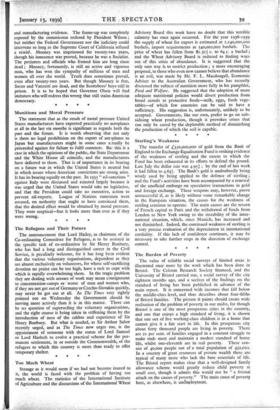The Burden of Poverty The value of reliable social surveys
of limited areas is illustrated once more by the work which has been done in Bristol. The Colston Research Society financed, and the University of Bristol carried out, a social survey of the city eighteen months ago, and a section of the findings on the standard of living has been published in advance of the main report. It is concerned With incomes that fall below the middle-class level, and thus describes about four-fifths of Bristol families. The picture it paints should create wide realisation of the problem of poverty in our midst, for though Bristol is one of the most prosperous cities in the country, and one that enjoys a high standard of living, it is shown that one out of five working-class children is in a home that cannot give it a fair start in life. In this prosperous city about forty thousand people are living in poverty. There are 21 per cent. of families engaged in a constant struggle to make ends meet and maintain a modest standard of home life, whilst one-eleventh are in real poverty. These con- sist of 40,000 people out of a total population of 452,00a. In a country of great resources of private wealth these are typical of many more who lack the bare essentials of life. The Bristol report makes clear that a well-designed family allowance scheme would greatly reduce child poverty at small cost, though it admits this would not be " a frontal attack on the causes of poverty." The main cause of poverty here, as elsewhere, is unemployment.






































 Previous page
Previous page